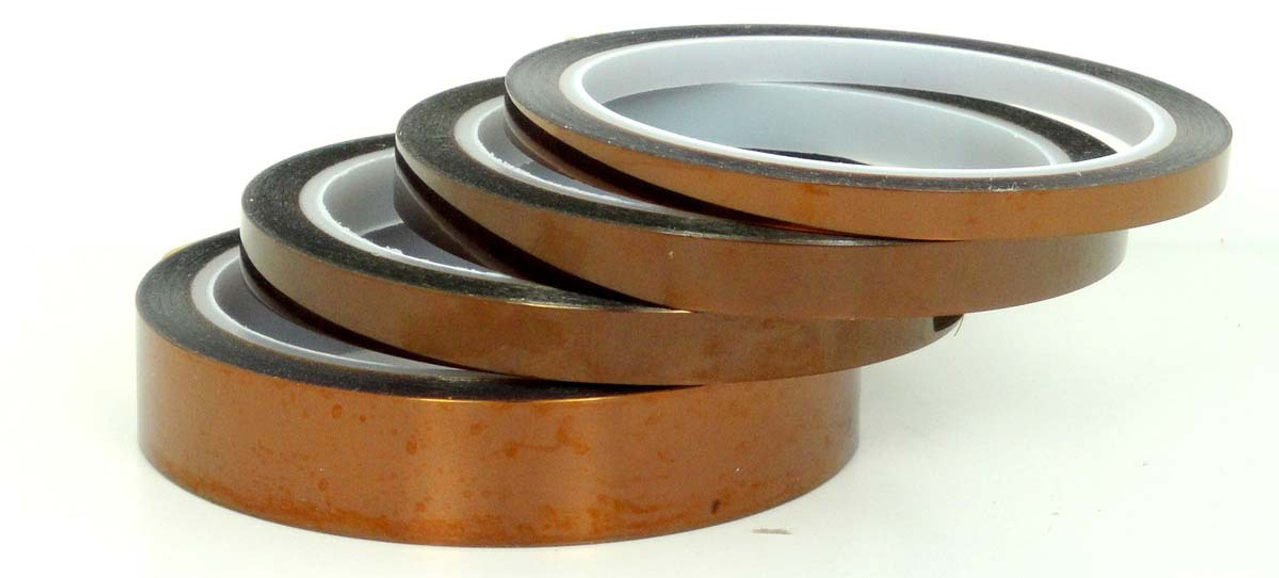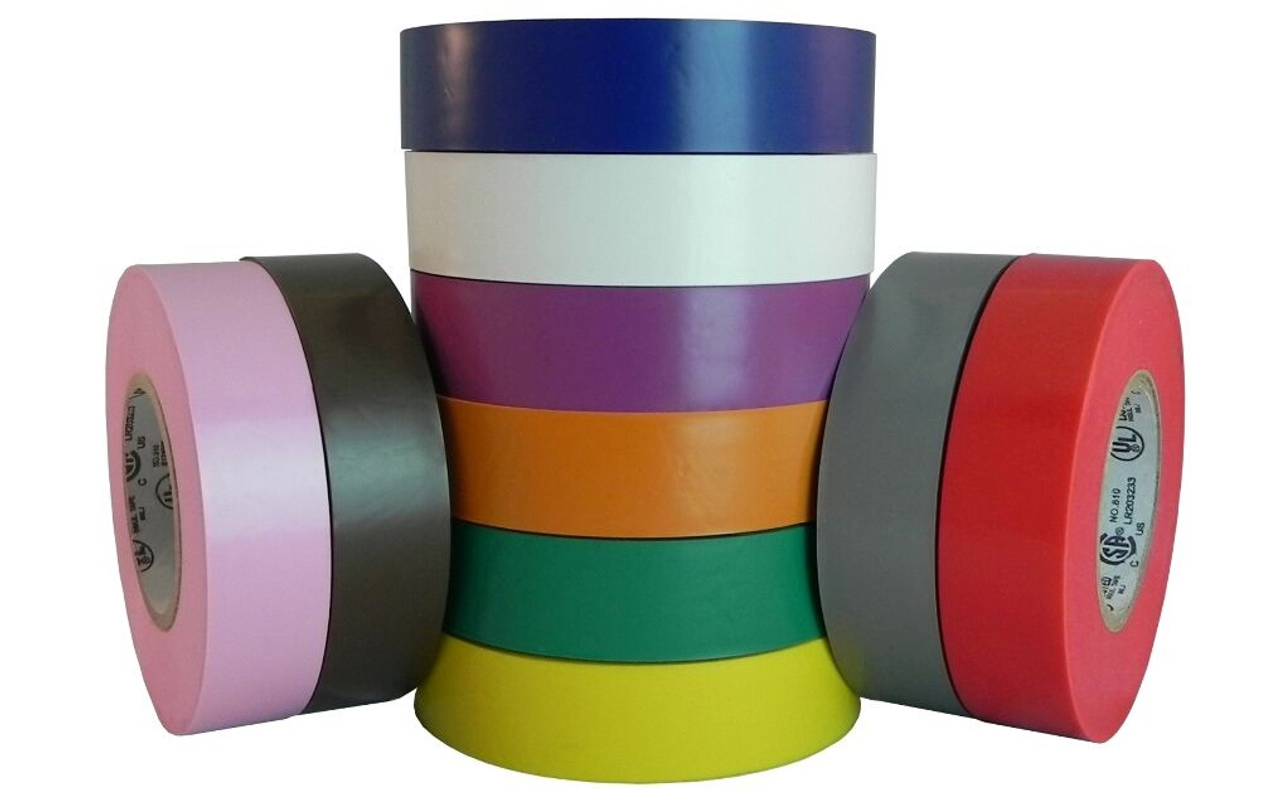Tape for Electricity: What Works, What Doesn’t & Safety Tips
Insulating and securing your electrical wires, cables, and other components may seem easy, but using the wrong tape can have disastrous results.
Why Choosing the Right Tape for Electrical Work Matters
It's a common misconception that any tape will do for electrical work, but that's a dangerous myth. Electricity and adhesives are a high-stakes pairing, posing significant danger to people and structures alike. Not all tapes dampen electrical current. Some actually conduct electricity, which can lead to arc flashes and electrocution. In addition, some adhesives are extremely flammable, making them ill-suited to potential electrical exposure.
In this guide, you'll learn about the safest materials for electrical tape, the different situations where you should use electrical tape, and where other tools would be better. We also provide an easy comparison of the most common electrical tape options and safety tips for your installation.
What Is Electrical Tape Made Of?
Tape for electricity comes in a wide range of core and adhesive materials, each of which offers unique benefits for certain applications.
Vinyl Tapes
Vinyl is the most common base material for electrical tape. It's highly flexible and resistant to moisture and corrosion. Vinyl electrical tape is a safe tape for wires in low-voltage applications, but it doesn't handle high temperatures well. It may leave adhesive residue behind when removed, and it doesn't adhere well to rough or fibrous surfaces.
Rubber Tapes
Rubber electrical tape is valued for its high stretch, electrical insulation, and ability to self-adhere. It conforms well to uneven and irregular surfaces for reliable insulation and protection.
Rubber insulating tape is better than vinyl for applications involving higher voltage and temperature. It is also better for moisture sealing in outdoor environments and moist conditions. Since rubber electrical tape is thinner than vinyl, it may require an extra layer to seal electrical components.
Polyimide Tapes
For extreme heat resistance and superior tear and abrasion resistance in electrical applications, electrical grade Kapton® tape alternatives are ideal. These polyimide tapes with silicone adhesive are the best for insulating electrical components in temperatures ranging from -452°F to 500°F.
Tape Jungle's polyimide Kapton® alternative tapes are popular in a wide range of high-performance industries, including:
- Automotive: switches, diaphragms, sensors, and heating coils
- Aerospace: aircraft insulation and spacecraft wings
- Medical: Electric insulation for X-ray equipment
- Manufacturing: Masking for powder coating, e-coating, anodizing, and electroplating
Acrylic Adhesives vs. Rubber Adhesives
In addition to the core material, consider the type of nonconductive adhesive that will best meet your needs. For temporary or short-term indoor applications, rubber adhesives provide good initial tack. They are more cost-effective than acrylic adhesives, but typically have lower durability and less resistance to heat, chemicals, and UV exposure.
Opt for an acrylic adhesive for long-term or permanent indoor and outdoor applications. Acrylic adhesives have high adhesion and excellent resistance to UV light, solvents, and temperature fluctuations.
Safety Standards
When selecting the right tape for your electrical application, look for specifications that meet your needs for dielectric strength and temperature resistance. For optimal safety, use a product that is Underwriters Laboratories (UL) listed. UL is an independent safety organization that conducts rigorous testing on approved products to ensure they meet safety and performance standards.
Where You Should Use Electrical Tape
Electrical tape is ideal for temporary and non-permanent fixes:
- Basic wire bundling
- Insulating low-voltage connections
- Temporary low-voltage splicing
- Temporary wire and cable labeling
- Color coding wires and cables
- Securing wire nuts and terminal covers
Where You Shouldn't Use Electrical Tape
While you can use electrical tape as a temporary solution, it's not appropriate for certain situations, including:
- Permanent high-voltage splices
- Heavy-duty wire insulation
- Outdoor exposure without rated UV and weather resistance
- As a structural fastener
- To repair damaged wires or frayed cords
- To hold wires together inside wire nuts
You should also avoid tape as a fix for visible damage and high-risk circumstances where you see burn marks, cracked or brittle wire insulation, exposed wires at connections, or any sparking, flickering, or buzzing.
In short, avoid using electrical tape for any long-term or hazardous electrical situations, including as a replacement for wire nuts. Contact an electrician and incorporate safe professional fixes to address these issues.
Tip Box:
If you wouldn't trust it behind a wall, don't use it in your main line circuit.
Comparing Electrical Tape Types
This chart can help you decide which electrical tape is best for your application:
Type
Best Use Case
Temp Range
Rating
VinylGeneral indoor jobs-18°C to 105°CUL 510RubberIrregular surfacesUp to 80°CHigh stretchPolyimideHigh-heat/electronicsUp to 260°CFlame retardantPVC Electrical TapeHeavy-duty installsVariesWeather-resistant
Kapton® Tape vs. Kapton® Alternatives

Kapton® is the brand name for a polyimide film used for high-performance applications like aerospace and electronics. It was developed by DuPont™ in the 1960s and has become widely used for products like protective space blankets and flexible printed circuits due to its high thermal stability, dielectric strength, and chemical resistance.
As a tape material, Kapton® provides excellent insulation for electrical wires and components, masks sensitive surfaces for painting and plating, and provides protective packaging for semiconductors during shipping.
The Rise of Kapton® Alternatives
Kapton® alternatives are becoming increasingly popular due to the high cost and limited performance of the name-brand product. Many Kapton® tape alternatives meet or exceed the high-temperature resistance and electrical insulation of the name brand, and are available at much more affordable prices.
Tape Jungle offers quality polyimide-style tape ideal for use in wave soldering, masking applications in high temperatures, and electronic component wrapping. The tape consists of clear polyamide coated with silicone adhesive that leaves minimal residue when removed. This makes it perfect for use in manufacturing circuit boards and protecting gold contacts from molten solder during hot air wave solder leveling.
Safety Tips for Using Tape Around Electricity
When using tape around electricity, safety is important. Follow these tips to protect yourself and others:
- Don't overstretch the tape. If you stretch electrical tape too far, it weakens the adhesive, which can make the tape less durable and reliable.
- Wrap tape with 50% overlap. By overlapping the layers of electrical tape using the "half-lap" method, you get a continuous seal and optimal insulation. This ensures protection from environmental conditions and moisture.
- Always cut tape, don't tear it. Cutting places less stretch pressure on the tape, so you can avoid overstretching, deformation, and poor adhesion. It also prevents the tape from loosening over time as it shrinks back to its original shape.
- Store in a cool, dry place. Electrical tape exposed to moisture or high temperatures can suffer from adhesive and core degradation. UV exposure from the sun can also diminish electrical tape quality.
- Replace any tape that dries, cracks, or lifts. Even highly durable electrical tape may lose its adhesion, crack, or dry. Repair any inconsistencies or gaps in your electrical tape as soon as possible. If you notice frequent degradation, consider upgrading to a tape or other solution more suited to the application.
What Tape Jungle Recommends
At Tape Jungle, we pride ourselves on providing a wide selection of electrical tape products to meet every electrical adhesive need. Our electrical tapes are available in black and colored plasticized PVC and high-performance polyimide.
- Black Electrical Tape: Our all-weather black ¾ inch electrical tape is heat resistant, cold weather resistant, and flame-retardant. Made from plasticized PVC backing and rubber-based adhesive, this tape is ideal for use in general insulation, color coding electrical wires, and securing wire harnesses for automotive applications.
- Colored Electrical Tape: Available in a wide range of colors, our ¾ inch 7 Mil colored electrical tape is composed of plasticized PVC and a rubber-based adhesive. Use for indoor and outdoor electrical insulation up to 600 volts, as well as wrapping wires and cable splices, and color-coding wires. Our colored electrical tape is highly conformable and resistant to moisture, sunlight, weather, and most chemicals.
- Polyimide Tape (Kapton® Alternative): Looking for a Kapton® alternative? Explore our high-temp options, including our electrical grade alternative polyimide film. Coated with high-performance silicone, this thin and conformable tape provides superior tear and abrasion resistance, even at elevated temperatures.
Choose from a wide range of backing materials, adhesives, thicknesses, and widths rated for everything from technology and HVAC to automotive, aerospace, and electronic applications.
Final Thoughts
Electrical tape is an important tool for many applications and industries. You can use it to hold wire harnesses and cable bunches together, color code wiring, and protect surfaces from heat exposure. Remember to only use electrical tape for low-voltage, temporary applications, and avoid using it for high-voltage splicing or dangerous electrical issues. If you aren't sure if tape is appropriate, always consult with a seasoned electrician.
Do your research when choosing electrical tape for your application. Tape options range from everyday rubber and vinyl to high-performance Kapton® alternatives ideal for aerospace and automotive applications. Evaluate the risks associated with your application and make sure you use rated materials appropriate for your application's voltage, temperature, moisture, and UV exposure.
Shop electrical tape with Tape Jungle to find the best adhesive solution for your project.


 Canadian Dollar
Canadian Dollar
